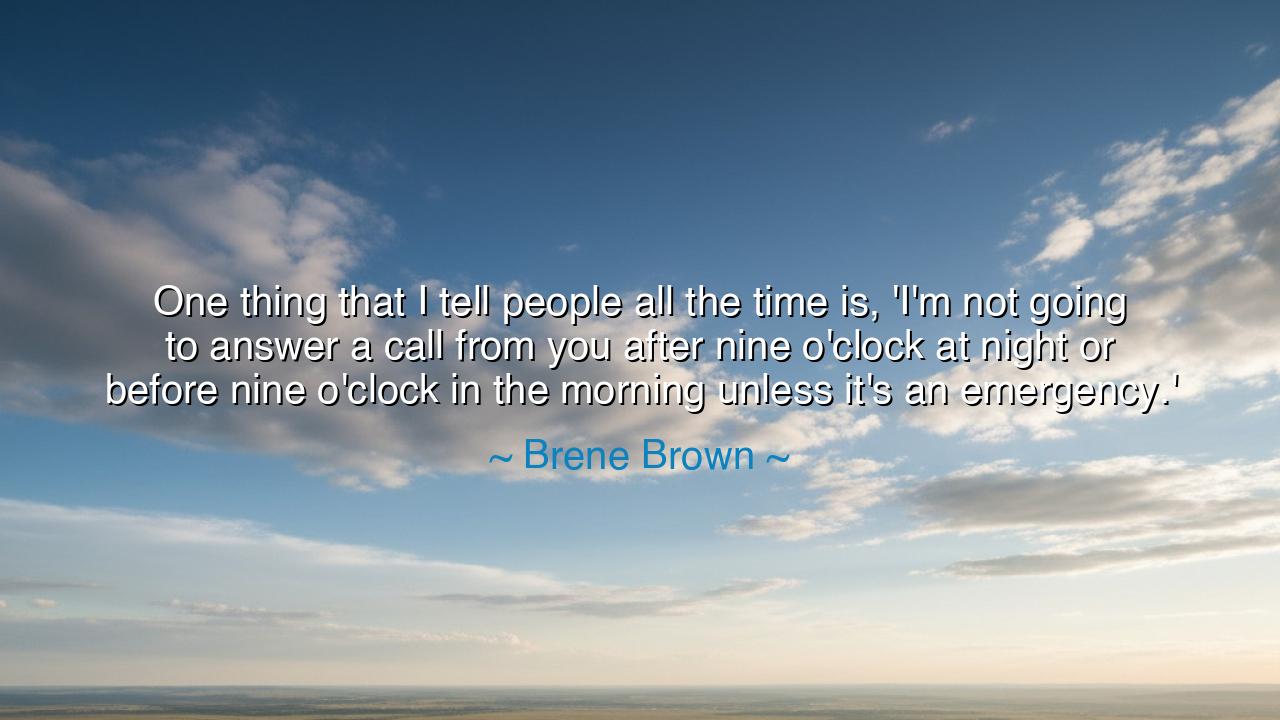
One thing that I tell people all the time is, 'I'm not going to
One thing that I tell people all the time is, 'I'm not going to answer a call from you after nine o'clock at night or before nine o'clock in the morning unless it's an emergency.'






“One thing that I tell people all the time is, ‘I’m not going to answer a call from you after nine o’clock at night or before nine o’clock in the morning unless it’s an emergency.’” Thus spoke Brené Brown, the scholar of courage and vulnerability, whose words are at once boundary and blessing. At first, the saying may seem practical, even ordinary, but beneath it lies a profound truth: that to live well, one must guard the sacred rhythm of life, protecting the hours of rest and renewal from the ceaseless demands of others. For without boundaries, the soul is left exposed, worn thin by constant intrusion, unable to find its strength.
The origin of this wisdom rests in Brown’s lifelong study of shame, resilience, and human connection. She has seen how people exhaust themselves by striving to be endlessly available, believing that constant self-sacrifice is the measure of love. But true love, she teaches, is not found in perpetual giving without rest—it is found in balance, in knowing when to say yes and when to say no. Thus, her refusal to answer calls outside the bounds of day is not coldness, but clarity. It is a declaration that life requires limits if it is to remain whole.
The ancients, too, knew this truth. The Hebrews sanctified the Sabbath, a day when no work was to intrude, because they knew that rest is as holy as labor. The Stoics spoke of guarding one’s time as a treasure, for each wasted hour could never be reclaimed. Even warriors, preparing for battle, honored the night as a time of silence and sleep, lest they face the dawn unready. Brown’s words echo this timeless wisdom: to rise strong, one must first honor the hours of renewal, unbroken by needless noise.
History also gives us vivid examples. Consider Winston Churchill, who during the Second World War insisted on taking naps in the middle of the day. Some mocked him for this habit, but he knew that without rest, he could not lead with clarity. Or think of Eleanor Roosevelt, who fiercely protected her mornings for writing and reflection, despite the demands of a nation upon her. Both understood what Brown now teaches: those who guard their hours guard their strength, and those who guard their strength serve the world more fully.
From this we learn that saying no is often an act of greater love than saying yes. To refuse a call after nine is to say: “I honor myself enough to rest, so that when I give, I give wholly.” It is also to teach others that they, too, may set their own boundaries, that their worth is not measured by exhaustion. In this way, Brown’s practice is both shield and lantern—it defends her time, and it shows others the way to defend theirs.
Practical wisdom follows: set clear boundaries for your life. Guard your mornings, guard your evenings, guard the hours that belong to rest, to family, to the quiet work of the spirit. Tell others, gently but firmly, that you will not answer every call, nor open every door. And when emergencies come, you will be ready, because you have not spent your strength on the trivial. Boundaries are not walls—they are gates that protect what is most sacred.
Thus, remember Brené Brown’s words: “I’m not going to answer a call after nine or before nine unless it’s an emergency.” In them is not harshness, but wisdom. In them is not selfishness, but self-preservation. To live without boundaries is to be scattered; to live with them is to be strong. And when you are strong, rested, and whole, you will have the power to face the day with courage, to love with depth, and to rise, again and again, unbroken.






AAdministratorAdministrator
Welcome, honored guests. Please leave a comment, we will respond soon